reproductive rights
What Does Reproductive Health Have to Do With Climate Vulnerability?
When Gufasha Moureen was 13 years old, a severe drought hit her village in the Kayunga district of Uganda. All her family’s crops were destroyed, sending them into a financial crisis.
Being the eldest daughter of five children, she had to leave school and help her mother at home with fetching water, cooking and childcare. One day, an elderly man visited their home and told Moureen’s father that he wanted to marry her.
Her father, who was in desperate need of money and saw no other option for Moureen, agreed. Moureen married, got pregnant and died the same year during a complicated childbirth.
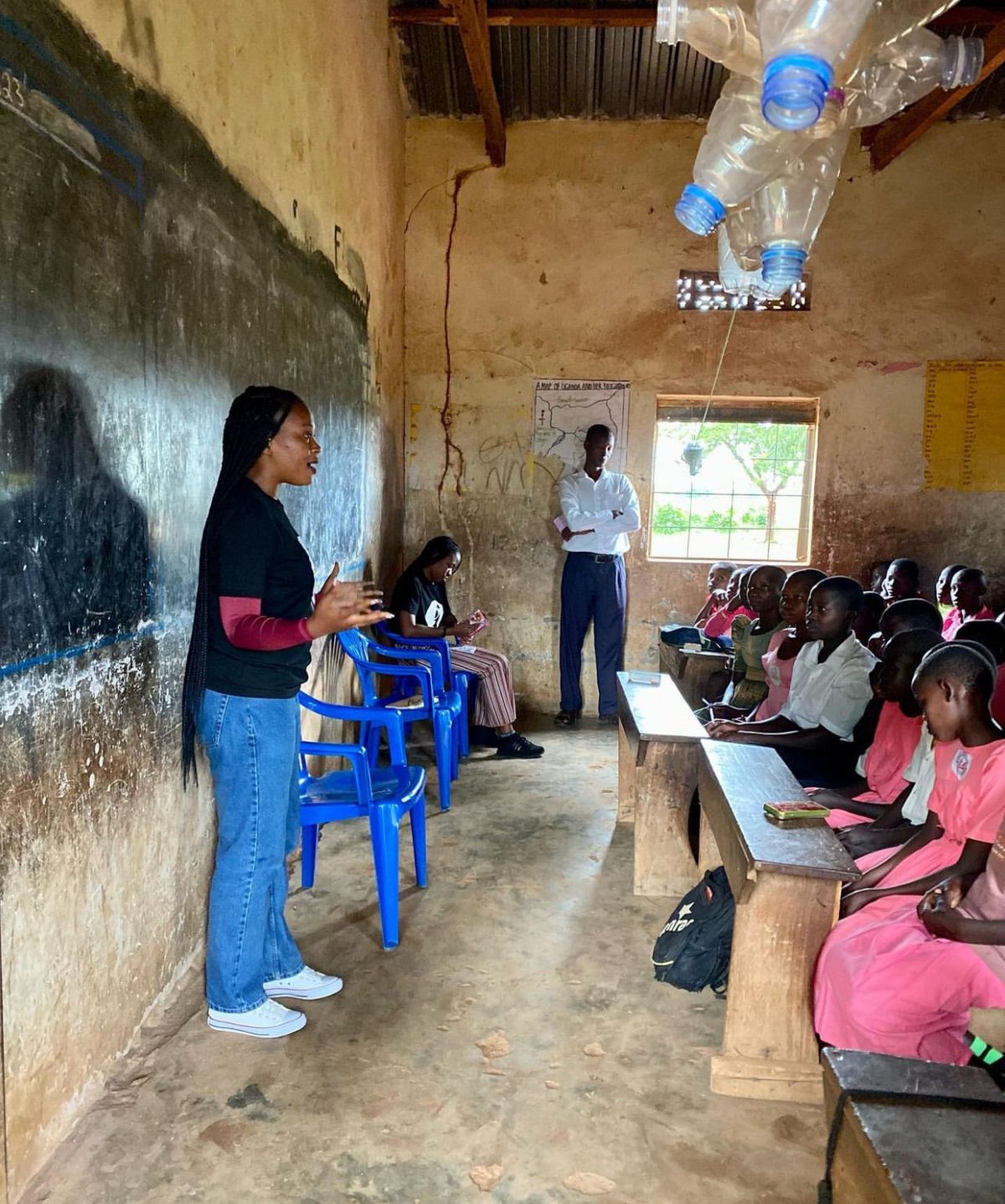 The Gufasha Girls Foundation works to educate girls about family planning. Credit: Joan Kembabazi
The Gufasha Girls Foundation works to educate girls about family planning. Credit: Joan Kembabazi
“That is just one of many devastating stories of how climate change affects young girls worldwide. Had the drought not hit her village, Moureen could have stayed at school and her life could have been different,” says Joan Kembabazi, Moureen’s best friend and founder of Gufasha Girls Foundation, a community-based nonprofit that advocates against child marriage and promotes girls’ education.
In Uganda, young girls and women face multiple challenges. Not only are they disproportionately affected by climate change but they also have limited access to modern contraceptive methods and have no comprehensive sexual and reproductive health education at schools (it was banned by the Parliament in 2016), which makes them even more vulnerable.
Kembabazi sees family planning as an essential tool for climate resilience. That’s why she’s committed to empowering girls and women with education and contraception. “I myself come from a big family and I know how hard it is for my father to provide for his 24 kids,” says the young Ugandan feminist activist. “If he had two or three, it would be much easier.”
Gufasha Girls Foundation is one of many organizations worldwide working to address the ways that poverty, food insecurity, climate change and family planning are linked — and the need to empower girls and women through education and family planning.
Healthy communities, healthy environment
In the Philippines, the PATH Foundation Philippines, Inc. (PFPI) has pioneered an approach that addresses population, health and the environment. When it started in the 1990s as a public health organization raising awareness about the prevention of HIV and AIDS, the foundation worked with young girls who moved to cities to work in the sex industry to support their families at home.
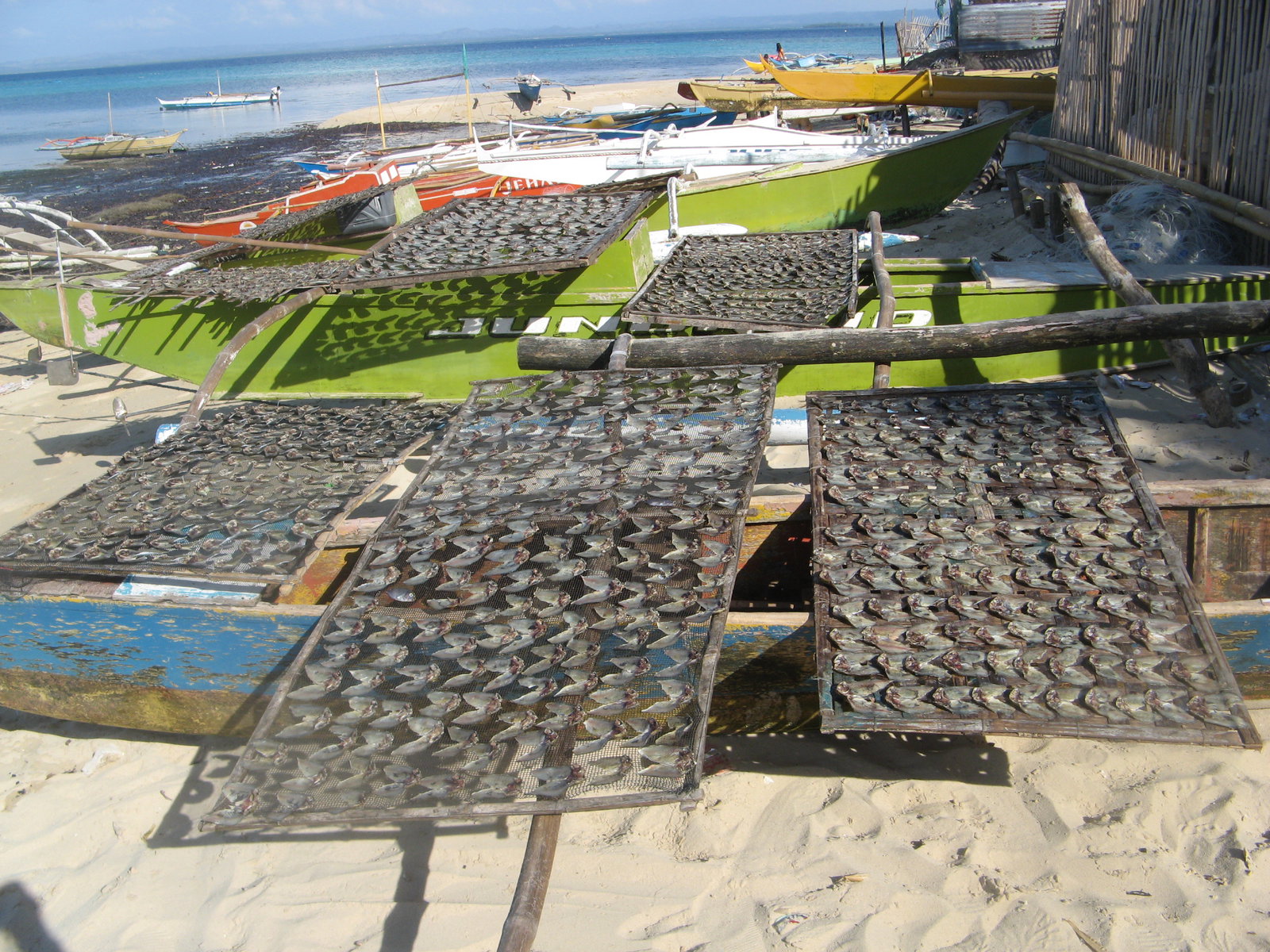 The PATH Foundation Philippines designated areas where fishermen could fish and areas where fishing was prohibited to give the fish stocks time to regenerate. Credit: Ellen Gallares
The PATH Foundation Philippines designated areas where fishermen could fish and areas where fishing was prohibited to give the fish stocks time to regenerate. Credit: Ellen Gallares
PFPI staff understood that if they wanted to help prevent young girls from contracting HIV, they would have to look at the root causes that led them to this line of work. They went to the poor fishing communities where the girls came from (namely the Danajon Bank and Verde Island Passage, which are extremely rich in marine biodiversity) and learned that fishermen there were facing pressure to catch more fish to sustain a growing population.
But since the fish stocks did not have time to regenerate, there were fewer fish every year. This meant that the families had less food and income and were more inclined to send their daughters away to contribute to the budget.
Between 2008 and 2013, PFPI worked with other organizations and the local community to improve the management of 2,000 hectares of marine protected areas. They designated areas where fishermen could fish and areas where fishing was prohibited to give the fish stocks time to regenerate.
Crushed by negative news?
Sign up for the Reasons to be Cheerful newsletter.
[contact-form-7]
Over the course of five years, the fish stocks increased and the food security and economic situation improved. The fishermen also started branching out into other ways to make money, such as selling produce from vegetable gardening, livestock and fowl keeping, running small businesses and tourism.
Besides sustainable management of resources, PFPI also addressed the health needs of the communities. In these isolated rural areas where access to contraceptives was limited to only a few health clinics, it partnered with small convenience stores that started selling condoms and birth control pills in every village.
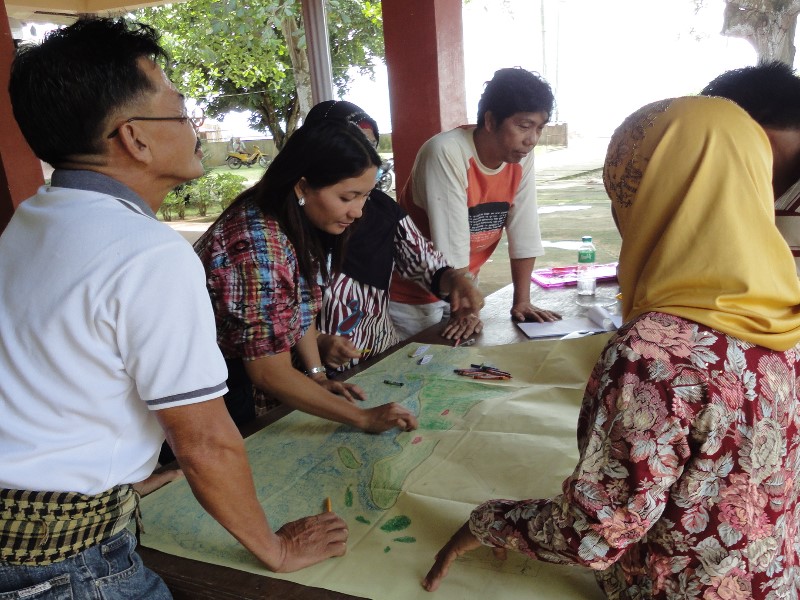 The PATH Foundation Philippines has pioneered an integrated approach that addresses population, health and the environment. Credit: PATH Foundation Philippines
The PATH Foundation Philippines has pioneered an integrated approach that addresses population, health and the environment. Credit: PATH Foundation Philippines
The foundation worked with local leaders — mainly youth, couples, women and fishermen — who then educated their peers about the benefits of family planning, HIV prevention, water and sanitation and malnutrition. Through these peer educators and educational shows on local TV and radio, PFPI was able to reach 1.5 million people. As a result, the rate of contraceptive use among married women of reproductive age increased from 31 percent to 45 percent.
Following its success in the Philippines, PFPI has been advocating for this integrated approach to address climate change, food insecurity and public health in other places in need around the world.
A lack of recognition
On the local level, this approach has been replicated in many parts of the world, including in Venezuela, Colombia, Madagascar, Uganda and Nepal). But on the national level, securing climate and gender justice is not always high on policy makers’ priorities.
At last year’s COP28 in Dubai, representation of women was staggeringly low: only 15 out of 133 world leaders present were women. “When it comes to decision-making power, you can’t make decisions that have the whole world in mind when half the population is not represented in the room,” says climate and community development expert Carissa Patrone Maikuri.
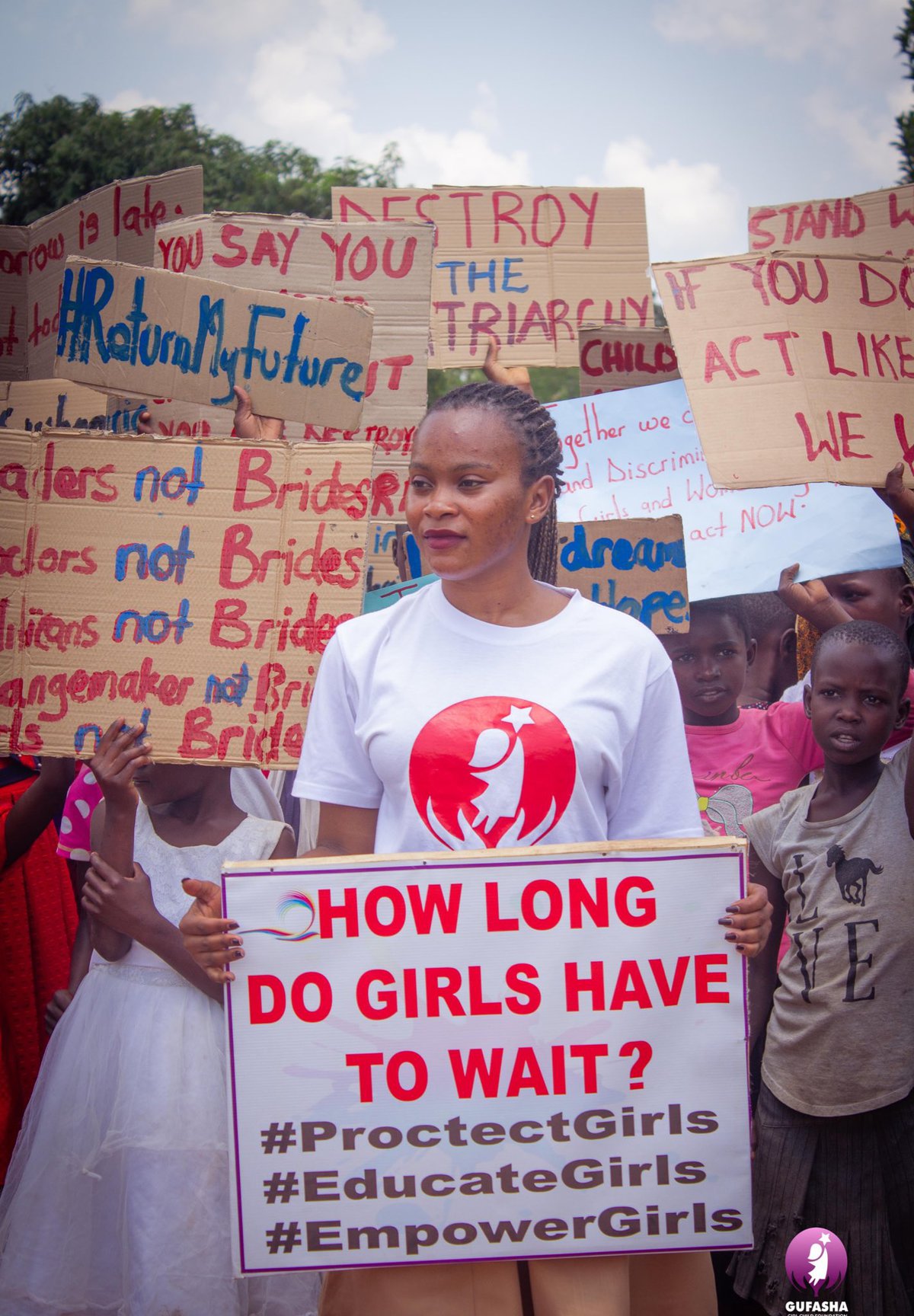 Young girls and women in Uganda have limited access to modern contraceptive methods and no comprehensive sexual and reproductive health education at schools. Credit: Joan Kembabazi
Young girls and women in Uganda have limited access to modern contraceptive methods and no comprehensive sexual and reproductive health education at schools. Credit: Joan Kembabazi
According to the Feminist Climate Justice report, by 2050, up to 158 million more girls and women might be pushed into poverty due to climate change. And yet, many countries’ adaptation plans still don’t mention sexual and reproductive health and rights or universal education as essential human rights or as important adaptation strategies.
Presently, more than 218 million women in low- and middle-income countries want to avoid pregnancy but are not using a modern method of contraception. Globally, nearly half of all pregnancies are unintended.
Turning the tide
It makes sense that, when women are able to choose whether, when, with whom, or how many children to have, they can further pursue their education, tend to have better access to work opportunities, and can improve their own health and that of their families. But the connection to climate change can be harder for people to make.
Patrone Maikuri is among those working to spread the message that family planning can boost women’s resilience to environmental and climatic shocks and stressors. “Many climate folks don’t understand how sexual and reproductive health and rights [are] connected to climate resilience, and as a result, they shy away from the conversation,” she says. “But in the past few years, there has been a small movement that is looking at climate action in a more holistic and intersectional way.”


Become a sustaining member today!
Join the Reasons to be Cheerful community by supporting our nonprofit publication and giving what you can.
A growing number of international organizations have been advocating for gender equality and women’s and girls’ reproductive rights to be embedded into climate solutions and climate justice. For example, the Intergovernmental Panel on Climate Change highlighted voluntary and rights-based family planning as a climate adaptation strategy in its 2014 assessment report. And in 2023, the UN Women called for a new feminist climate justice approach.
The tide is turning, according to Carina Hirsch, head of advocacy and policy at the nonprofit Margaret Pyke Trust. She points to the growing alliance of health-focused organizations that are advocating at a national level with both climate and conservation sectors as well as growing interest from donors to fund this kind of work.
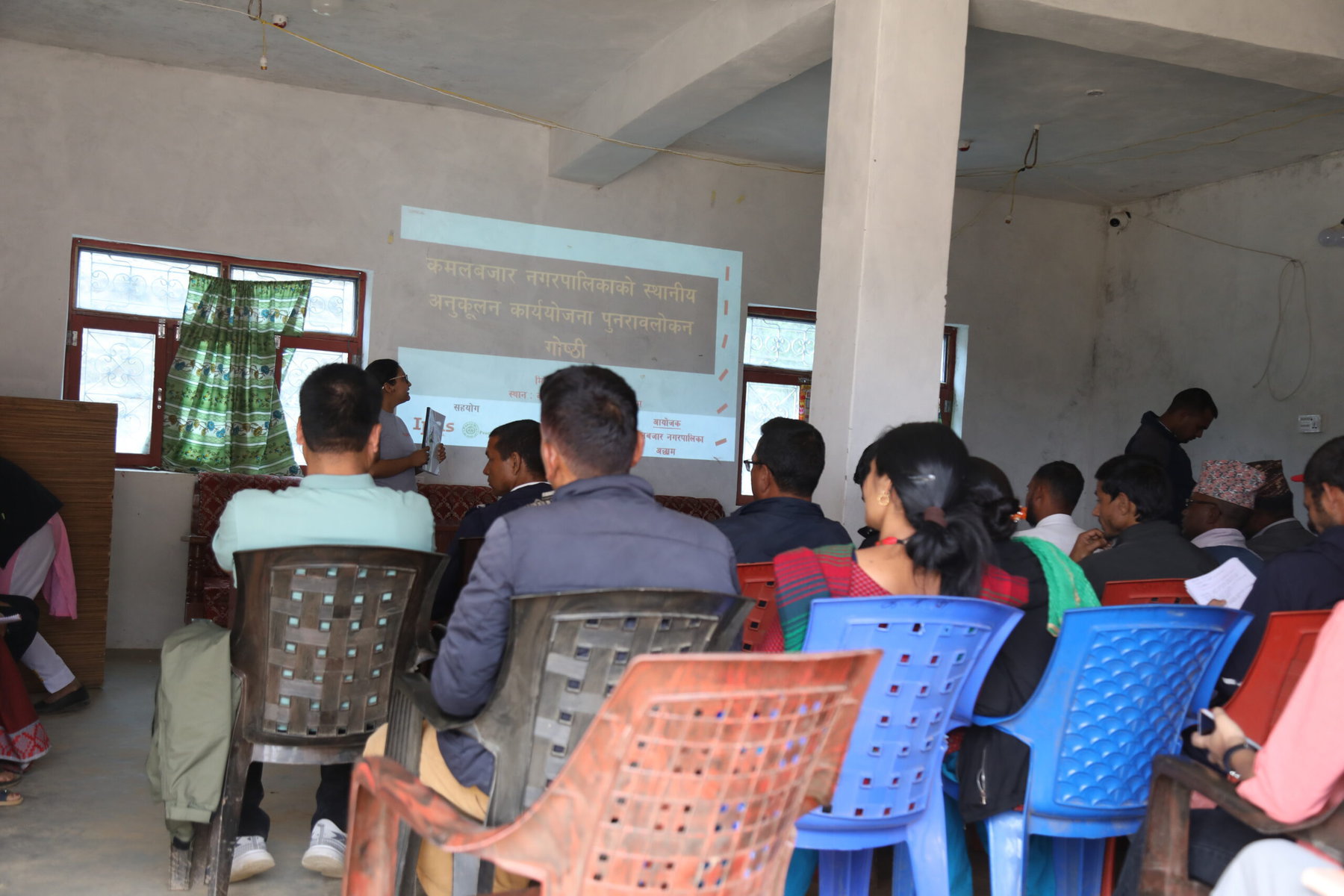 A Local Adaptation Plan of action review workshop in Nepal. Credit: Ipas Nepal
A Local Adaptation Plan of action review workshop in Nepal. Credit: Ipas Nepal
For her, one of the most exciting recent developments was the announcement at COP28 that the UK will provide £16 million in funding focused on the importance of reproductive choice as part of climate resilience building.
Khusbu Poudel, the program coordinator at reproductive rights nonprofit Ipas Nepal, sees this as a welcome change. Nepal is one of the most climate vulnerable countries in the world, and Ipas Nepal helped local governments prepare Local Adaptation Plans for Action, which integrate gender, climate and sexual and reproductive health and rights. “Investing in women, children and adolescents is one of the most impactful climate actions a country can make,” says Poudel, who participated at COP28.
The urgency, Hirsch notes, is clear: “We cannot wait. Climate change is coming no matter what and we know it,” she says. “The least we can do is to make people, particularly women and girls in remote rural communities, that are being hit hardest by climate change, more resilient.”
The post What Does Reproductive Health Have to Do With Climate Vulnerability? appeared first on Reasons to be Cheerful.
Student Groups Are Distributing Free Emergency Contraceptives on Campus
This story was originally published by KFF Health News.
Limya Harvey and Cydney Mumford set up a folding table a few times a month on the University of Texas-San Antonio (UTSA) campus to give away kits containing emergency contraceptives, condoms and lube, or menstrual products like tampons and pads. They typically bring 50 of each type of kit, and after just an hour or two everything is gone.
The 19-year-old sophomores — Harvey is enrolled at UTSA and Mumford at Northeast Lakeview College — founded the organization Black Book Sex Ed last spring. Their mission is to educate students and others in need about sexual health and connect them with free services and products packaged into kits they distribute on campus, in the community and through their website.
“Both of us grew up rather lower-income,” Mumford said, “so there’s a soft spot as it relates to people who say, ‘Oh, I just don’t have it right now.’ That’s part of the reason we started doing this.”
Harvey and Mumford aren’t alone. A growing number of students on college campuses nationwide are stepping in to provide other students with free or low-cost emergency contraceptives, birth control and menstrual products.
Crushed by negative news?
Sign up for the Reasons to be Cheerful newsletter.
[contact-form-7]
They are also pushing back against threats to their reproductive freedom since the US Supreme Court’s Dobbs decision last year, which eliminated federal abortion protections.
Although emergency contraceptives are legal in every state, some policymakers worry that in states that ban or severely restrict abortion, access to emergency contraceptives and other types of birth control may erode because of people failing to distinguish between drugs that prevent pregnancy and medications used for abortions.
“Our requests for help have quadrupled since Dobbs,” said Kelly Cleland, the executive director of the American Society for Emergency Contraception, which provides toolkits and technical assistance to help students develop what are becoming known as peer-to-peer distribution networks. Those student networks provide emergency contraceptives and bring vending machines to their campuses that carry the medications and other personal health care products. The organization has worked with students at more than 200 campuses.
Many types of emergency contraceptive pills are available over the counter and without age restrictions. Students who distribute them are generally not putting themselves at legal risk, especially if they ensure the products are in their original packaging and haven’t expired and refrain from providing medical advice, Cleland said. It’s like giving a friend a Tylenol, one advocate explained.
“It’s really growing and a really interesting new route for people to get what they need in trusted ways, especially in Texas and other states where there are repercussions from the Dobbs decision,” said Mara Gandal-Powers, director of birth control access at the National Women’s Law Center.
Like those of many student groups, Harvey and Mumford’s kits contain products — emergency contraceptive pills, tampons, lube, etc. — donated by nonprofits and companies. Black Book Sex Ed accepts financial donations as well and uses the money to buy items at big-box stores.
The University of Texas-San Antonio didn’t respond to requests for comment.
Across the country, at Bowie State University in Maryland, a graduate student took a different approach to improving student access to contraceptives.
What started as a class project last year for Jakeya Johnson’s master’s degree program in public administration and policy, eventually became state law.
Starting next year, the measure will require many Maryland public colleges to provide round-the-clock access to emergency contraception and develop a comprehensive plan to ensure students have access to all FDA-approved forms of birth control, plus abortion services.
As part of her project, Johnson, 28, started researching the availability of reproductive health care at Bowie State, and she quickly learned that options were somewhat limited. When she called the health center, she was told that emergency contraception was available only to students who went through counseling first and that, while the college prescribed birth control, there was no pharmacy on campus where students could fill their prescriptions. She proposed that the school install a vending machine stocked with emergency contraceptives, condoms, pregnancy tests and other sexual health products. But college officials told her they didn’t have money for the machines. Her research showed that students at other colleges in Maryland faced similar roadblocks.
So, Johnson approached state Delegate Ariana Kelly, now a state senator, about introducing a bill that would require schools to provide access to emergency contraceptives and other contraceptive services.
The bill, which was signed in May, requires the schools to provide the services by August 2024.
“There was definitely some pushback” from conservative legislators during the process, Johnson said. Although the final bill didn’t include requirements for transportation services or school reporting that Johnson wanted, she was heartened by the amount of support the bill received from parents and students.
In the spring, Johnson received a public service fellowship from the University System of Maryland that has enabled her to work with her student health center to develop a blueprint for Bowie State that other schools can follow, she said.
“It’s something that in 2023 we shouldn’t have to be fighting for,” she said.” We should already have it.”
“The legislation was confirmation and affirmation of the direction we were headed anyway,” said Michele Richardson, director of the Henry Wise Wellness Center at Bowie State. She noted that the school is in the process of bringing to campus wellness vending machines, which will be installed by August.
But increasing access is more challenging elsewhere.
At Loyola University Chicago, a Jesuit college, members of the organization Students for Reproductive Justice aren’t permitted to host events on campus or reserve space in meeting rooms. The Loyola for Life group, which opposes abortion, faces no such restrictions.
While Loyola “welcomes an open exchange of ideas,” only registered student organizations that are “congruent with our values as a Jesuit, Catholic institution” can submit activity requests or reserve space on campus, said Matthew McDermott, a spokesperson for the university.
Oral contraceptives are provided only to students who need them for reasons unrelated to preventing pregnancy, and resident advisers are not permitted to distribute condoms or other forms of birth control.
“That’s where Students for Reproductive Justice comes in,” said Andi Beaudouin, 21, who for the past two years has overseen the group’s distribution of free emergency contraception. “We were like, ‘If the university isn’t going to do it then we will.’ Everyone deserves this and we don’t need to feel embarrassed or hesitant about getting the resources that we need.”
Beaudouin and other volunteers take orders for emergency contraception by email. They package pills with two pregnancy tests and some pads and liners in case of bleeding and hand off the kits to students either on campus or nearby. In the past two years, they’ve filled orders for more than 100 kits.


Become a sustaining member today!
Join the Reasons to be Cheerful community by supporting our nonprofit publication and giving what you can.
When the Supreme Court ruled in Dobbs, the number of requests skyrocketed, Beaudouin said. The group posted on Instagram pleading with students not to stockpile pills, because its supplies were very limited.
“People understood, but I felt really bad about it,” they said. (Beaudouin uses the pronoun they.)
Beaudouin doesn’t think university officials know that the reproductive health group distributes emergency contraceptives on campus. And Loyola for Life has picketed their off-campus condom distribution events, but it has gotten better since the reproductive health group asked them to stop, Beaudouin said.
Loyola for Life didn’t respond to a request for comment.
The national anti-abortion group Students for Life of America wouldn’t object to students distributing free pregnancy tests and menstrual products, said Kate Maloney, manager of the group’s Campaign for Abortion Free Cities. But they would object to distribution of emergency contraception, which they claim is an abortion-causing drug.
Still, the reproductive justice groups shouldn’t be prohibited from operating on campus, Maloney said. “We’re not going to say whether a group should be denied the right to exist,” she said, “because that has happened a lot to us.”
KFF Health News is a national newsroom that produces in-depth journalism about health issues and is one of the core operating programs at KFF — an independent source of health policy research, polling, and journalism. Learn more about KFF.
const mid = "G-J74WWTKFM0"; const as = "hSkxMZYJRLS-y9mGqHjZ7g"; const cid = decodeURIComponent(document.cookie.match("(?:^|;)\\s*_ga=([^;]*)")[1]).match(/(\d+\.\d+)$/)[1];window.fetch("https://www.google-analytics.com/mp/collect?measurement_id="+ mid +"&api_secret="+ as, { method: "POST",body: JSON.stringify({ client_id: cid, non_personalized_ads:true, events:[{ name:"republish", params:{republish_title: document.getElementById("chl-title").innerText.toString(),republish_url: document.getElementById("chl-url").value.toString(),republish_loc: window.location.href}}]})});
The post Student Groups Are Distributing Free Emergency Contraceptives on Campus appeared first on Reasons to be Cheerful.